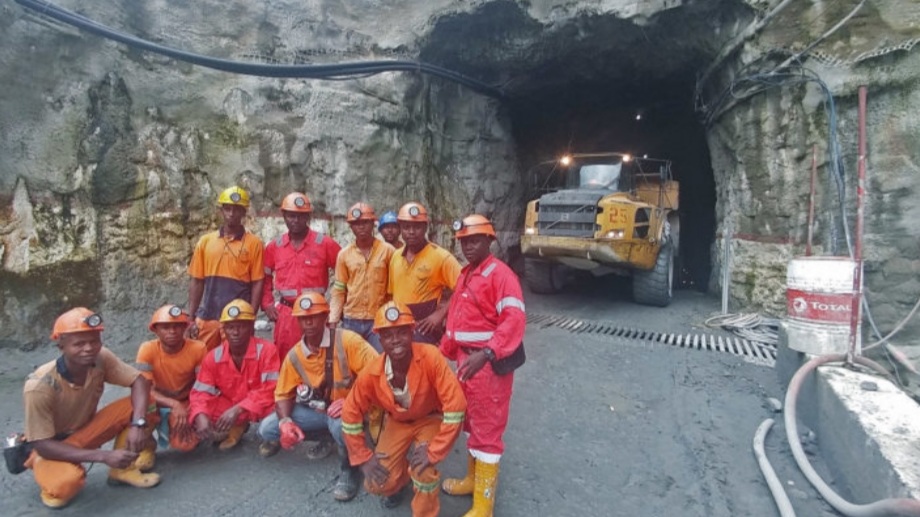Residents of Koidu, in northeastern Sierra Leone, are pursuing a class-action lawsuit against the operators of a diamond mine they say has dumped toxic mine waste, damaged homes, and cost many their livelihoods.
On Feb. 17, three black-suited lawyers representing the Marginalized Affected Property Owners (MAPO) entered the stately High Court building in Makeni, three hours outside Sierra Leone’s capital, Freetown. They had come to argue that Octea Ltd., its subsidiaries, and company executives are responsible for serious social and environmental harm in Kono district.
It was the second hearing of the case in little more than a week, and the latest in a much longer series of defensive legal maneuvers by the mining company’s owners.
Among the plaintiffs in the case is Sia Jannet Bayo, who alleges the mining company damaged her house, polluted her family’s water supply, harmed her health, and broke resettlement agreements. “We used to farm and live in peace, but now our lands and water sources are poisoned and covered in rubble. Our homes are shaken by explosives every day,” she told Mongabay.
Diamonds were first discovered in this area in the 1930s, and Kono remains the most important diamond-producing district in Sierra Leone. In addition to formal and artisanal diamond mining, Kono’s inhabitants grow rice, cassava, palm oil, and coffee.
The issue between the mining company and the residents of the communities of Saquee, Sokogbeh, Sowaray, New Sembehun and Manjamadu in Kono district dates back to 2010, when another diamond mining company, Koidu Ltd., was issued a 20-year mining lease.

In 2011 and 2012, Koidu Ltd. conducted an environmental impact assessment for its planned operations and formulated a resettlement action plan for affected residents.
But very few households were resettled, and those that were complained that the houses the company built were of poor quality.
The mine began operating in the early 2000s, originally owned by the mercenary company Executive Outcomes. Nearby residents have long complained of noise, environmental degradation, loss of livelihoods, dumping of toxic waste, and various health concerns, including skin rashes, digestive problems, headaches, high blood pressure, and respiratory problems.
In March 2019, 73 Koidu residents and a newly registered civil society organization, the Marginalized Affected Property Owners (MAPO), filed a class-action lawsuit alleging breaches of contract, contraventions of the Mining Act of 2009, and failure to respect a resettlement agreement signed in 2011-2012.
But pinning down the mine’s ownership and responsibility has proved challenging.
In 2007-08, BSG Resources Ltd., owned by mining and diamond tycoon Beny Steinmetz, took over the Koidu mine. BSGR’s corporate structure is a tangled web that includes Koidu Holdings, Koidu Ltd., Octea Mining, Octea Diamond Ltd., BSG Resources, and more. Complicating the Koidu residents’ case further, the London Court of International Arbitration granted Brazilian mining giant Vale SA a $1.2 billion judgment against BSGR, finding that BSGR had corruptly obtained mining licenses in Guinea; BSGR then filed for bankruptcy.
Appearing before the court earlier this month, the lawyer for Koidu Holdings, Drucil Taylor, said the company’s contracts and obligations are with the Sierra Leonean government, not the residents of Kono district, and so the lawsuit should be dismissed. This week, he argued that since 2019, the company has built more than 800 homes and provided 76 wells for the community, in line with its commitments under the resettlement agreement. Taylor said some members of MAPO have refused to accept their new homes.
Representing the plaintiffs, Benedict Jalloh rejected this, saying Koidu Holdings had built far fewer homes than it now claimed and the houses it did build were not for MAPO members. MAPO’s lawyer told the court he would present evidence of this at ithe next hearing.
“The underlying case is a critical one,” Jalloh said, “both for accountability of mining companies in West Africa and for the communities suffering from Octea’s behavior. People deserve to be treated well when their natural resources are being exploited. Octea and the other owners of the Koidu mine have done their best to dodge our plaintiffs at every turn.” The case was adjourned and the next hearing scheduled for Mar. 2.


 Post a comment
Post a comment










Comment(s)
Disclaimer: Comments expressed here do not reflect the opinions of Sierraloaded or any employee thereof.
Be the first to comment